Post by Greg C. on Jun 8, 2007 22:45:31 GMT -5
Following the Battle of the Alamo, Santa Anna, at the head of more than seven hundred men, was in hot pursuit of Sam Houston and the Texas Army. Houston's retreat, known as "The Runaway Scrape", was criticized by the Texas Government, Texas Citizens, and Houston's own army.
While pursuing Sam Houston, Santa Anna reached Harrisburg on the 15th of April, 1836. The last communication from the war department at that town was dated on the 14th. The president and vice-president had gone to look after their families on the 13th; Colonel Potter had been for some time at Galveston, attending to the affairs of the navy; Colonel Rusk was in the army; the secretary of state had been some time sick, east of the Trinity: so that the attorney-general and secretary of the treasury were the only cabinet officers left at the seat of government.
As to his future course, the commander-in-chief had kept his own counsel. He had already notified the army to be in readiness for action; and Colonel Rusk, with whom he advised and consulted in all matters, gave notice, in his proclamation of the 13th of April, that the Texans had taken up the line of march to meet the enemy; yet the determination of the commander-in-chief was only known to the secretary of war. On the morning of the 15th, Major Martin and his command, being worn out and exhausted with fatigue, were directed to conduct the families, that were flying from the seat of war, to Robbins's ferry; while the main army, augmented by the detachments that had come in, set out rapidly for Harrisburg. The prairies were wet, filled with quicksands, and almost impassable. The prospect was gloomy indeed, and the troops were much dispirited; yet they were encouraged in seeing the commander-in-chief put his shoulder to the wheels to assist the wagons through the mud. On that day they marched entirely through the prairie, and encamped at Mrs. McCarely's, at the first timber. As the army left Donoho's, a negro, who had been captured and then released by the enemy, brought General Houston a message from Santa Anna, to the effect that "he knew Mr. Houston was up there in the bushes; and, so soon as he had whipped the land-thieves, down there, out of the country, he would come up and smoke him out !"
Indian Worries
There was at that time a considerable number of disaffected persons on the coast, east of the San Jacinto; and it was an important object with Houston not to allow the Mexicans to have communication with them, as they would thereby obtain supplies of provisions and gain information. They would also, by such means, be enabled to control the Indians on the lower Trinity. With a view to anticipate any intercourse between the enemy and these Indians, Houston had engaged Messrs. Hubert and Rankin, Indian agents, to sound the Cooshatties on the question of giving the Texans aid. They promised to furnish ninety warriors. Just before the army set out for Harrisburg, the commander-in-chief sent Captain Jacob H. Sheppard with a "talk" to the Indians, and an order to the agents to bring on the warriors.*
* Notes of J. H. Sheppard. Captain Sheppard says : "Just as I was leaving the general's quarters, I said, 'Where will I find you, general?' He said : 'Tell all the people you may see, captain, that I am determined to fight, the first chance; and, if I should meet with a reverse, I will be sure to make noise enough for you and the Indians to follow me.'"
It is sufficient to say here, that the Indians wished to see which side was successful before they turned out. But if the enemy had succeeded in opening an intercourse with the Indians, they might have rallied every tribe in eastern Texas, and thus surrounded and cut off the small army under Houston; and not only so, but closed the Texas campaign with a tragedy more bloody than the one with which it opened.
Capture of the Mexican Courier
To prevent this disastrous result, a forced march was made by the Texans from Donoho's to Harrisburg. They reached the bayou, opposite the town, on the 18th, a little before noon. Here they remained that day, partly to rest—for they were greatly fatigued—and partly to procure information. Deaf Smith, Karnes, and others, were sent over to reconnoiter. The former, about dark, brought into the camp two captives whom he had taken on the road leading west from Harrisburg—the one a Mexican courier bearing dispatches to Santa Anna, the other a guard. From the spies it was ascertained that the Mexican advance had marched down Buffalo bayou, crossing Vince's bridge; and, having burnt Harrisburg, had passed down in the direction of the bay. From the Mexican courier* they obtained the mail directed to Santa Anna, from which they learned the important fact, before suspected, that the dictator himself was with the advance, and that they had him cut off from the main body of his troops.
* This was a Mexican officer, an extraordinary courier, who had come on from the city of Mexico. — Juan J. Andrade to Santa Anna, April 9, 1836.
Some explanation of the manner in which Deaf Smith captured and brought in these two prisoners, is necessary. It is given as related by the general himself. Smith came in, greatly fatigued, and somewhat exasperated. He repaired to the general's quarters, and said he wished to have a little talk with him. Said he: " General, you are very kind to these Mexicans; I like kindness, but you are too kind — you won't allow me to kill any of them. If a man meets two of the enemy, and is not allowed to kill either, by the time he takes one and ties him, the other gets off so far, that it is very fatiguing on a horse to catch him; and I wish you would let me manage things in my own way." Houston told him not to be cruel, but that he must be his own judge of the necessity of securing such of the enemy as might be taken by him. Smith nodded his head —for he was a man of few words—and retired.
By reference to the topography of that locality, it was seen that he must necessarily return by Vince's bridge, or cross Buffalo bayou, just below the Texan camp, at Lynch's, at the mouth of the San Jacinto. In either way he was cut off from the main body of his army. The Texans derived the further information that Santa Anna was requested, by the government at home, to give protection with his troops to the surveyor and commissioner, appointed on the part of Mexico, to run the boundary-line between Texas and the United States, according to the treaty between the two nations, and for which purpose Colonel Pedro Garcia Condo was appointed surveyor, and Colonel Almonte commissioner. A letter from General Filisola to Santa Anna gave the information that the chief's order as to the disposition of certain forces was received, and would be obeyed. This was supposed, as afterward proved to be the fact, to refer to reinforcements ordered by Santa Anna.
Houston Prepares for Battle
These dispatches being read, General Houston determined to cross the bayou early on the morning of the 19th, and go in pursuit of the enemy. Orders were consequently given to Colonels Burleson and Sherman to have three days' rations prepared, and like orders for repairing a boat two miles below, on the bayou. The troops were formed on the morning of the 19th, and addressed by the commander-in-chief and the secretary of war. The presence of Santa Anna with the enemy's advance was also made known to them. The baggage and wagons, and two or three hundred sick and non-effectives were left in charge of Major McNutt, on the left bank of the bayou. Houston then dispatched a letter to Henry Raguet, advising him that they were about to meet Santa Anna; that they had looked in vain for help from eastern Texas; that it was then the part of wisdom, growing out of necessity, to encounter the enemy; that no previous occasion justified it; that they were going to conquer; that the troops were in fine spirits, and, though the odds were against them, they would use their best efforts to fight the enemy to such advantage as to gain the victory.*
* —No. 43. Colonel Rusk also sent out the following address, to which the commander-in-chief added a postscript:
" WAR DEPARTMENT, HEADQUARTERS OF THE ARMY, HARRISBURG, April 19, 1836.
"TO THE PEOPLE OF TEXAS—Fellow-Citizens: Let me make one more appeal to you to turn out, and rally to the standard of your country. The army reached here yesterday late in the day. Our scouts arrested three of the Mexicans—one captain, one a correo [express-rider], direct from Mexico, and another a servant. From the prisoners we learn many interesting facts. Santa Anna himself is just below us, and within the sound of the drum—has, we understand, only five hundred men. We are parading our forces for the purpose of marching upon him. He has a reinforcement of about one thousand men upon the Brazos, about forty miles from here. A few hours more will decide the fate of our army : and what an astonishing fact it is, that, at the very moment when the fate of your wives, your children, your honors, your country, and all that is dear to a freeman, are suspended upon the issue of one battle, not one fourth of the people [men] of Texas are in the army! Are you Americans? are you free-men ? If you are, prove your blood and birth by rallying at once to your country's standard ! Your general is at the head of a brave and chivalrous band, and throws himself, sword in hand, into the breach, to save his country, and vindicate her rights. Enthusiasm prevails in the army; but I look around and see that many, very many, whom I had anticipated would be first in the field, are not here.
"Rise up at once, concentrate, and march to the field ! —a vigorous effort, and the country is safe ! A different course disgraces and ruins you; and what is life worth with the loss of liberty? May I never survive it!
" Your fellow-citizen, THOMAS J. RUSK, Secretary of War."
" April 19, 1836.
"We view ourselves on the eve of battle. We are nerved for the contest, and must conquer or perish. It is vain to look for present aid: none is at hand. We must now act, or abandon all hope! Rally to the standard, and be no longer the scoff of mercenary tongues! Be men, be freemen, that your children may bless their fathers' names!
"Colonel Rusk is with me, and I am rejoiced at it. The country will be the gainer, and myself the beneficiary. Liberty and our country !
SAM HOUSTON, Commander-in-Chief."
The above are the last papers written by these gentlemen previous to the battle of the 21st.
The army proceeded on its march, taking only the cavalry-horses, and those needed for the " Twin-Sisters" and an ammunition-wagon. The measles having broken out in the camp, caused the large number of sick that were left behind. Advancing to the ferry, they found the boat not repaired, not-withstanding which they proceeded to cross. Thirty pioneers, under Captain Wood, first passed over. The commander-in-chief went with the second boat. Colonel Rusk remained to assist in the crossing, and none labored more ardently to effect that object. A raft of plank was used to facilitate the passage. The horses were caused to swim across the bayou below the ferry. Before sundown the whole force had passed over without accident, and took up the line of march down the right bank of the bayou, and on the enemy's trail.
After advancing twelve miles, the Texans halted at one o'clock on the morning of the 20th, at a beautiful spot in the prairie. At this time they were aware that the Mexicans had not crossed the San Jacinto, but it was not known exactly where they were. In fact, they had passed near the ferry at Lynch's on the 16th. The Texans, being greatly exhausted by incessant labor and marching, threw themselves on the ground without refreshment, and slept.
We must here notice the narrow escape of President Burnet. On the 13th, as has been stated, he left Harrisburg, to provide for the safety of his family. On the same day he brought them to New Washington, below Lynch's, on the bay, with a view to facilitate their passage, if necessary, to Galveston. On the next day the president set out on horseback for Harrisburg; but learning on the way that the Mexicans were there, he returned on the morning of the 16th, in the steamer "Cayuga," to New Washington. It was understood that the boat, which was crowded with families, and bound for Anahuac, was to return the next morning to take off those at New Washington. On the morning of the 17th, after breakfast, and while they were preparing for the steamboat, the Mexican cavalry came suddenly on them. They hastily got into a small boat, and had not rowed more than forty yards from the shore, when the enemy dismounted ; but they fortunately made their escape.
Skirmish on April 20, 1836
At dawn of day, on the 20th, the Texans were aroused by a tap of the drum —for the reveille was forbidden—and resumed their march down the bayou. After proceeding about seven miles, they halted for breakfast. While it was in preparation, the scouts came in, and announced that they had given chase to those of the enemy, until they discovered his advance coming up the bay. The Texans, without taking breakfast, made a forced march down the bayou, in order to arrive at Lynch's ferry before their opponents. An advance of thirty or forty of the Texans proceeded rapidly to the ferry, where they arrived by ten o'clock in the morning, and found a like number of the enemy there, with a substantial new flatboat, loaded with provisions for the Mexican army. It was doubtless some of the plunder of Harrisburg or New Washington. The enemy's guard fled at the approach of the Texan advance ; the boat and provisions were taken, and sent up the bayou, three fourths of a mile to the rear of the Texan camp, which was established there, along the right bank of the bayou, in a skirt of timber. This supply of provisions was most fortunate, as the Texans had no other during that and the following day.
While pursuing Sam Houston, Santa Anna reached Harrisburg on the 15th of April, 1836. The last communication from the war department at that town was dated on the 14th. The president and vice-president had gone to look after their families on the 13th; Colonel Potter had been for some time at Galveston, attending to the affairs of the navy; Colonel Rusk was in the army; the secretary of state had been some time sick, east of the Trinity: so that the attorney-general and secretary of the treasury were the only cabinet officers left at the seat of government.
As to his future course, the commander-in-chief had kept his own counsel. He had already notified the army to be in readiness for action; and Colonel Rusk, with whom he advised and consulted in all matters, gave notice, in his proclamation of the 13th of April, that the Texans had taken up the line of march to meet the enemy; yet the determination of the commander-in-chief was only known to the secretary of war. On the morning of the 15th, Major Martin and his command, being worn out and exhausted with fatigue, were directed to conduct the families, that were flying from the seat of war, to Robbins's ferry; while the main army, augmented by the detachments that had come in, set out rapidly for Harrisburg. The prairies were wet, filled with quicksands, and almost impassable. The prospect was gloomy indeed, and the troops were much dispirited; yet they were encouraged in seeing the commander-in-chief put his shoulder to the wheels to assist the wagons through the mud. On that day they marched entirely through the prairie, and encamped at Mrs. McCarely's, at the first timber. As the army left Donoho's, a negro, who had been captured and then released by the enemy, brought General Houston a message from Santa Anna, to the effect that "he knew Mr. Houston was up there in the bushes; and, so soon as he had whipped the land-thieves, down there, out of the country, he would come up and smoke him out !"
Indian Worries
There was at that time a considerable number of disaffected persons on the coast, east of the San Jacinto; and it was an important object with Houston not to allow the Mexicans to have communication with them, as they would thereby obtain supplies of provisions and gain information. They would also, by such means, be enabled to control the Indians on the lower Trinity. With a view to anticipate any intercourse between the enemy and these Indians, Houston had engaged Messrs. Hubert and Rankin, Indian agents, to sound the Cooshatties on the question of giving the Texans aid. They promised to furnish ninety warriors. Just before the army set out for Harrisburg, the commander-in-chief sent Captain Jacob H. Sheppard with a "talk" to the Indians, and an order to the agents to bring on the warriors.*
* Notes of J. H. Sheppard. Captain Sheppard says : "Just as I was leaving the general's quarters, I said, 'Where will I find you, general?' He said : 'Tell all the people you may see, captain, that I am determined to fight, the first chance; and, if I should meet with a reverse, I will be sure to make noise enough for you and the Indians to follow me.'"
It is sufficient to say here, that the Indians wished to see which side was successful before they turned out. But if the enemy had succeeded in opening an intercourse with the Indians, they might have rallied every tribe in eastern Texas, and thus surrounded and cut off the small army under Houston; and not only so, but closed the Texas campaign with a tragedy more bloody than the one with which it opened.
Capture of the Mexican Courier
To prevent this disastrous result, a forced march was made by the Texans from Donoho's to Harrisburg. They reached the bayou, opposite the town, on the 18th, a little before noon. Here they remained that day, partly to rest—for they were greatly fatigued—and partly to procure information. Deaf Smith, Karnes, and others, were sent over to reconnoiter. The former, about dark, brought into the camp two captives whom he had taken on the road leading west from Harrisburg—the one a Mexican courier bearing dispatches to Santa Anna, the other a guard. From the spies it was ascertained that the Mexican advance had marched down Buffalo bayou, crossing Vince's bridge; and, having burnt Harrisburg, had passed down in the direction of the bay. From the Mexican courier* they obtained the mail directed to Santa Anna, from which they learned the important fact, before suspected, that the dictator himself was with the advance, and that they had him cut off from the main body of his troops.
* This was a Mexican officer, an extraordinary courier, who had come on from the city of Mexico. — Juan J. Andrade to Santa Anna, April 9, 1836.
Some explanation of the manner in which Deaf Smith captured and brought in these two prisoners, is necessary. It is given as related by the general himself. Smith came in, greatly fatigued, and somewhat exasperated. He repaired to the general's quarters, and said he wished to have a little talk with him. Said he: " General, you are very kind to these Mexicans; I like kindness, but you are too kind — you won't allow me to kill any of them. If a man meets two of the enemy, and is not allowed to kill either, by the time he takes one and ties him, the other gets off so far, that it is very fatiguing on a horse to catch him; and I wish you would let me manage things in my own way." Houston told him not to be cruel, but that he must be his own judge of the necessity of securing such of the enemy as might be taken by him. Smith nodded his head —for he was a man of few words—and retired.
By reference to the topography of that locality, it was seen that he must necessarily return by Vince's bridge, or cross Buffalo bayou, just below the Texan camp, at Lynch's, at the mouth of the San Jacinto. In either way he was cut off from the main body of his army. The Texans derived the further information that Santa Anna was requested, by the government at home, to give protection with his troops to the surveyor and commissioner, appointed on the part of Mexico, to run the boundary-line between Texas and the United States, according to the treaty between the two nations, and for which purpose Colonel Pedro Garcia Condo was appointed surveyor, and Colonel Almonte commissioner. A letter from General Filisola to Santa Anna gave the information that the chief's order as to the disposition of certain forces was received, and would be obeyed. This was supposed, as afterward proved to be the fact, to refer to reinforcements ordered by Santa Anna.
Houston Prepares for Battle
These dispatches being read, General Houston determined to cross the bayou early on the morning of the 19th, and go in pursuit of the enemy. Orders were consequently given to Colonels Burleson and Sherman to have three days' rations prepared, and like orders for repairing a boat two miles below, on the bayou. The troops were formed on the morning of the 19th, and addressed by the commander-in-chief and the secretary of war. The presence of Santa Anna with the enemy's advance was also made known to them. The baggage and wagons, and two or three hundred sick and non-effectives were left in charge of Major McNutt, on the left bank of the bayou. Houston then dispatched a letter to Henry Raguet, advising him that they were about to meet Santa Anna; that they had looked in vain for help from eastern Texas; that it was then the part of wisdom, growing out of necessity, to encounter the enemy; that no previous occasion justified it; that they were going to conquer; that the troops were in fine spirits, and, though the odds were against them, they would use their best efforts to fight the enemy to such advantage as to gain the victory.*
* —No. 43. Colonel Rusk also sent out the following address, to which the commander-in-chief added a postscript:
" WAR DEPARTMENT, HEADQUARTERS OF THE ARMY, HARRISBURG, April 19, 1836.
"TO THE PEOPLE OF TEXAS—Fellow-Citizens: Let me make one more appeal to you to turn out, and rally to the standard of your country. The army reached here yesterday late in the day. Our scouts arrested three of the Mexicans—one captain, one a correo [express-rider], direct from Mexico, and another a servant. From the prisoners we learn many interesting facts. Santa Anna himself is just below us, and within the sound of the drum—has, we understand, only five hundred men. We are parading our forces for the purpose of marching upon him. He has a reinforcement of about one thousand men upon the Brazos, about forty miles from here. A few hours more will decide the fate of our army : and what an astonishing fact it is, that, at the very moment when the fate of your wives, your children, your honors, your country, and all that is dear to a freeman, are suspended upon the issue of one battle, not one fourth of the people [men] of Texas are in the army! Are you Americans? are you free-men ? If you are, prove your blood and birth by rallying at once to your country's standard ! Your general is at the head of a brave and chivalrous band, and throws himself, sword in hand, into the breach, to save his country, and vindicate her rights. Enthusiasm prevails in the army; but I look around and see that many, very many, whom I had anticipated would be first in the field, are not here.
"Rise up at once, concentrate, and march to the field ! —a vigorous effort, and the country is safe ! A different course disgraces and ruins you; and what is life worth with the loss of liberty? May I never survive it!
" Your fellow-citizen, THOMAS J. RUSK, Secretary of War."
" April 19, 1836.
"We view ourselves on the eve of battle. We are nerved for the contest, and must conquer or perish. It is vain to look for present aid: none is at hand. We must now act, or abandon all hope! Rally to the standard, and be no longer the scoff of mercenary tongues! Be men, be freemen, that your children may bless their fathers' names!
"Colonel Rusk is with me, and I am rejoiced at it. The country will be the gainer, and myself the beneficiary. Liberty and our country !
SAM HOUSTON, Commander-in-Chief."
The above are the last papers written by these gentlemen previous to the battle of the 21st.
The army proceeded on its march, taking only the cavalry-horses, and those needed for the " Twin-Sisters" and an ammunition-wagon. The measles having broken out in the camp, caused the large number of sick that were left behind. Advancing to the ferry, they found the boat not repaired, not-withstanding which they proceeded to cross. Thirty pioneers, under Captain Wood, first passed over. The commander-in-chief went with the second boat. Colonel Rusk remained to assist in the crossing, and none labored more ardently to effect that object. A raft of plank was used to facilitate the passage. The horses were caused to swim across the bayou below the ferry. Before sundown the whole force had passed over without accident, and took up the line of march down the right bank of the bayou, and on the enemy's trail.
After advancing twelve miles, the Texans halted at one o'clock on the morning of the 20th, at a beautiful spot in the prairie. At this time they were aware that the Mexicans had not crossed the San Jacinto, but it was not known exactly where they were. In fact, they had passed near the ferry at Lynch's on the 16th. The Texans, being greatly exhausted by incessant labor and marching, threw themselves on the ground without refreshment, and slept.
We must here notice the narrow escape of President Burnet. On the 13th, as has been stated, he left Harrisburg, to provide for the safety of his family. On the same day he brought them to New Washington, below Lynch's, on the bay, with a view to facilitate their passage, if necessary, to Galveston. On the next day the president set out on horseback for Harrisburg; but learning on the way that the Mexicans were there, he returned on the morning of the 16th, in the steamer "Cayuga," to New Washington. It was understood that the boat, which was crowded with families, and bound for Anahuac, was to return the next morning to take off those at New Washington. On the morning of the 17th, after breakfast, and while they were preparing for the steamboat, the Mexican cavalry came suddenly on them. They hastily got into a small boat, and had not rowed more than forty yards from the shore, when the enemy dismounted ; but they fortunately made their escape.
Skirmish on April 20, 1836
At dawn of day, on the 20th, the Texans were aroused by a tap of the drum —for the reveille was forbidden—and resumed their march down the bayou. After proceeding about seven miles, they halted for breakfast. While it was in preparation, the scouts came in, and announced that they had given chase to those of the enemy, until they discovered his advance coming up the bay. The Texans, without taking breakfast, made a forced march down the bayou, in order to arrive at Lynch's ferry before their opponents. An advance of thirty or forty of the Texans proceeded rapidly to the ferry, where they arrived by ten o'clock in the morning, and found a like number of the enemy there, with a substantial new flatboat, loaded with provisions for the Mexican army. It was doubtless some of the plunder of Harrisburg or New Washington. The enemy's guard fled at the approach of the Texan advance ; the boat and provisions were taken, and sent up the bayou, three fourths of a mile to the rear of the Texan camp, which was established there, along the right bank of the bayou, in a skirt of timber. This supply of provisions was most fortunate, as the Texans had no other during that and the following day.

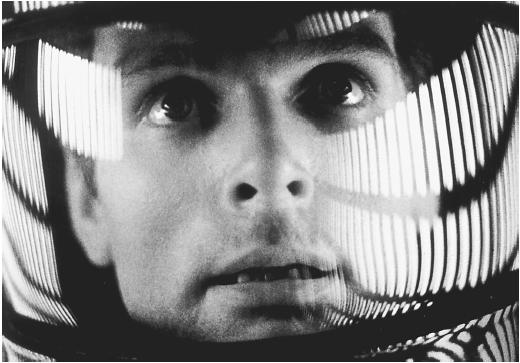


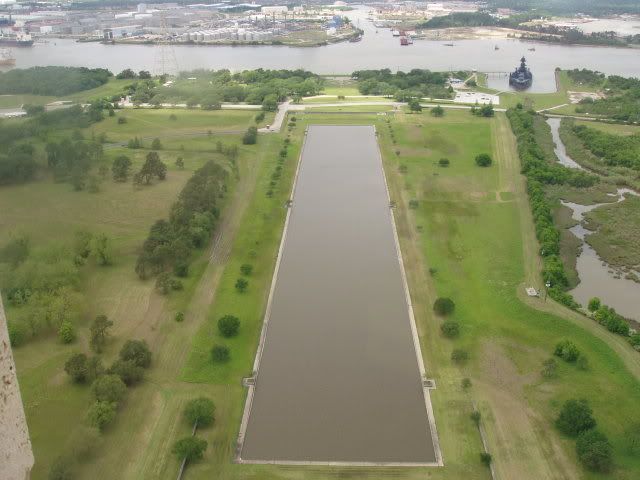
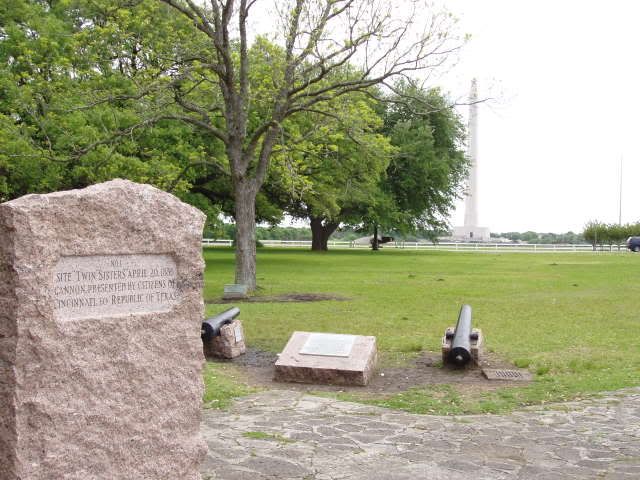
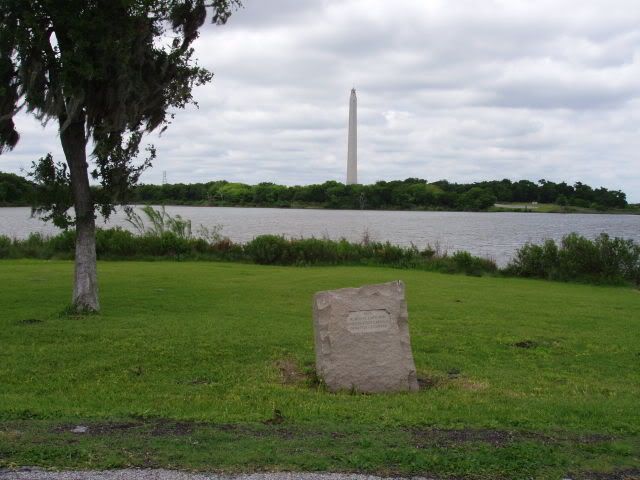
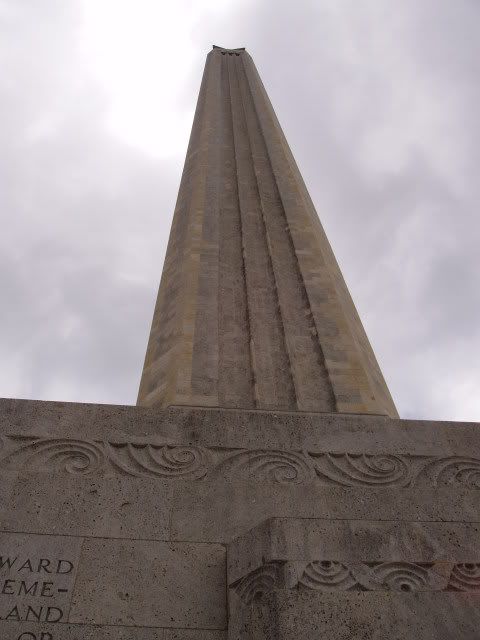
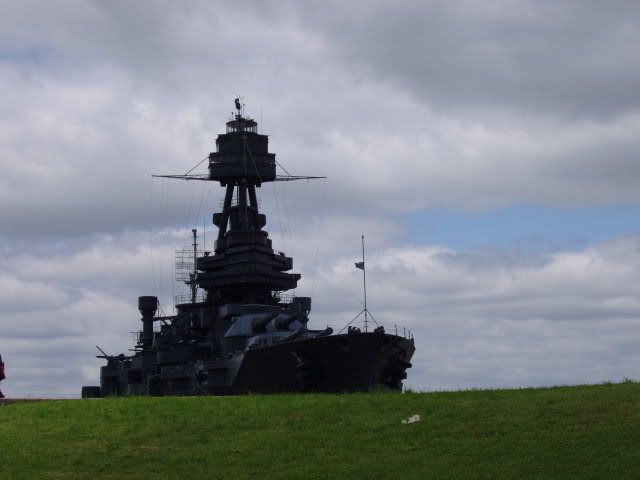

 , but it was quite awesome inside the monument
, but it was quite awesome inside the monument  . They even had artifacts dating from 1519!
. They even had artifacts dating from 1519!